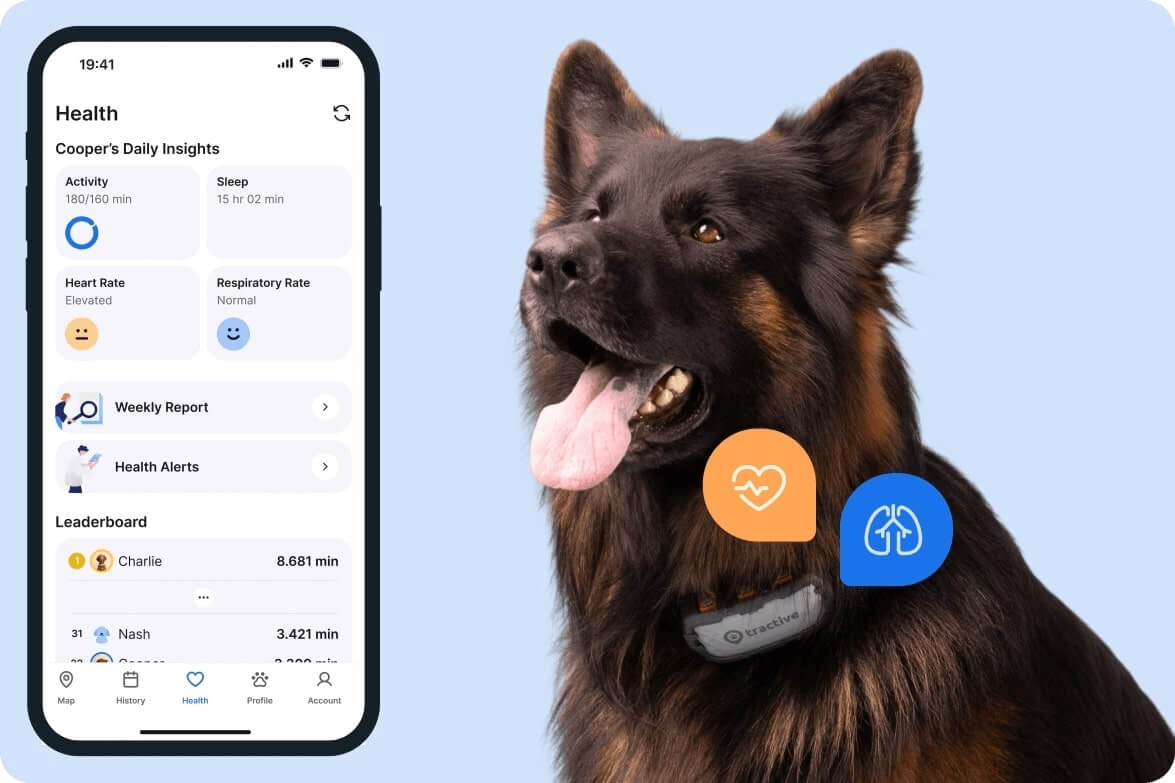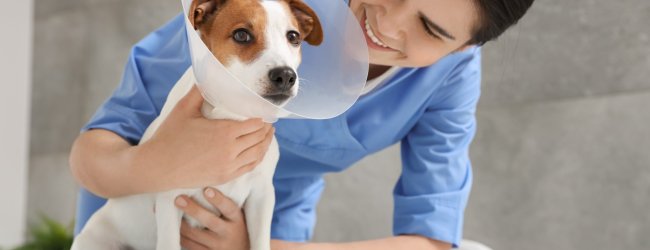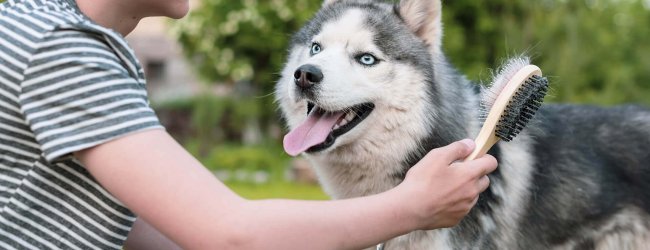 Approved by Dr. Dwight Alleyne, DVM
Approved by Dr. Dwight Alleyne, DVM Why Do Dogs Sleep So Much? And When Is Too Much?
A healthy dog is a dog that's gotten enough sleep. But sometimes, our pals sleep too much (and sometimes not enough). Ever wondered why - and how to spot a change in their sleep patterns early on?
Your dog’s sleeping habits might be a mystery to you. For example, why does your dog sleep in funny positions? How can they go from zero to nap in seconds anywhere, any time? How much do dogs sleep anyway… and why do dogs sleep so much? We’re here to answer all your questions – plus, how you can pick up on a change in their sleeping patterns and prevent a health emergency down the line.
Key Takeaways
Sleep is vital for a dog’s health.
Getting enough rest is crucial for their overall health and well-being – and it’s what helps puppies grow.
Sleep needs vary by age and other factors.
Puppies and senior dogs need more sleep than adults. Other factors like breed, size, exercise level, and changes in routine can also affect their sleep.
A change in sleep patterns can signal a health issue.
These could include cognitive dysfunction, depression, or other medical conditions.
A Tractive smart dog tracker can help.
With its built-in Sleep Tracker, your Tractive device monitors your dog’s sleep and activity levels. This data can help you identify any unusual changes and potentially detect health issues early on.

Always know your buddy is healthy & safe
Read more- Why do dogs sleep so much?
- Why a change in your dog’s sleep patterns is a big deal
- How much do dogs sleep by age?
- How much sleep do puppies need?
- How much sleep do adult dogs need?
- Why do older dogs sleep so much?
- Dog sleep requirements by breed
- Other factors that affect dog sleep
- Where a smart dog tracker steps in
Why do dogs sleep so much?
In a nutshell, the reason why dogs sleep so much is because it’s good for them. Like us humans, dogs need a good night’s sleep to function, re-energize and stay healthy. Without enough sleep, your dog is more likely to get sick. Or get into a “bad mood”, become disoriented or even aggressive. (Imagine how you are after 4 hours of sleep and no coffee and you get the picture.)
Making sure your dog gets enough sleep is key to their health and well-being. Besides helping them recover from the day’s activity, sleep helps puppies grow into healthy adults, makes it easier for dogs to learn and remember, and keeps their immune systems strong.
Why a change in your dog’s sleep patterns is a big deal
While it’s normal in most cases, a change in your dog’s sleep behaviors can indicate a potential health issue. These include cognitive dysfunction,1 as well as depression, hypothyroidism, or even diabetes.2
“Often, canine cognitive dysfunction syndrome is first noted by owners as unusual behavioral changes.
For example, an owner may notice that his or her dog is less responsive or connected to them emotionally, appears confused or disoriented, or has a change in established sleep-wake patterns — often increasing nocturnal activity.”
– Dr. Julie Buzby, DVM, CAVCA, CVA3
💡A smart dog tracker with Sleep Tracking can help you figure out how much your dog tends to sleep on average, plus how much quality sleep this includes – and also if there’s a weird change in your dog’s sleep cycles. We’ll cover it in detail a little further below.

Get health alerts for your dog
Our pups can’t always tell us if something’s wrong. But if their tracker detects unusual changes in their routine, you’ll get an alert, helping you catch potential issues early.
How much do dogs sleep by age?
It’s important to know how much sleep your dog needs to make sure they’re getting the right amount to stay healthy and happy. On average, dogs sleep about 12 -14 hours in a 24 hour period.4 75% of dog sleep happens at night, with the remaining 25% broken up into day naps.
How much sleep do puppies need?
About 18 to 20 hours each day. Puppy sleep – that is, sleep for dogs under 1 year-old – is crucial for development, and sleep deprivation has been shown to negatively impact a puppy’s health.5
How much sleep do adult dogs need?
Adult dogs between 1-6 years-old generally need less sleep than when they were puppies. Most adult dogs will be content and well-rested with anywhere from 8-14 hours of sleep a day.
Why do older dogs sleep so much?
Similar to puppies, older or senior dogs need more sleep than adult dogs. Senior dogs sleep about 18-20 hours a day. So as your dog grows older, it’s normal for them to start needing more sleep – especially between the ages of 5 and 10 years old. It’s (usually) nothing to be worried about. They just have less energy than they did when they were younger.
| Dog Age | Sleep Requirement |
|---|---|
| Puppies (0-12 months) | 18-20 hours |
| Adult Dogs (1-6 years) | 8-14 hours |
| Senior Dogs (6+ years) | 18-20 hours |
Dog sleep requirements by breed
Another important factor is the breed (and size) of your dog. Many dog parents don’t know this, but the size of the breed affects how much sleep they need. For example:
- Small dog breeds need approximately 14-16 hours of sleep each day.
- Medium dog breeds need only 10-14 hours of sleep per day.
- Large dog breeds, on the other hand, need up to 18 hours of solid rest per day.
Breeds also prioritize sleep differently. For example, if your dog breed was bred for performing important tasks, they might be less sleep-oriented.
Other factors that affect dog sleep
Besides age, breed and size, here are a few other things to watch out for.
Exercise
A dog’s activity level also affects how much sleep they’ll need. Dogs who are very active during the day often fall asleep easily – and enjoy their well-deserved rest. On the other hand, dogs who don’t get enough exercise are more likely to be restless and sleepless at night.
Changes in routine & surroundings
If your dog is not sleeping well, it could be because of recent changes on the home front. For example, if you welcomed a new two-legged or four-legged family member, or moved somewhere new, it could be that your dog is having a tough time adjusting. Or, or example, did their favorite dog walker change jobs recently? Or did you have to move them to new nap spot? Any changes to your dog’s routine can affect how much (or little) they sleep.
Noise can also cause fear and anxiety in dogs, which can affect their sleep. Parties or fireworks, in other words, are not ideal for well-rested dogs.
Temperature
You know how miserable sleeping on a sticky summer night can be? Your buddy does too. Dogs can get restless during hot evenings, but might find it just as hard to sleep if it’s too chilly. So set the AC accordingly.
When it’s hot out, your dog may spend more of their time sleeping. Or, you know, just lounging around. Hot, muggy weather can make dogs tired and make them want to siesta. As long as your dog keeps a normal body temperature, a little summer lazing should be no cause for alarm. Especially if you know how to help your dog stay cool in summer.
REM
As in “Rapid Eye Movement”, not the band. Dogs are more “flexible sleepers” than humans, and can generally fall asleep anywhere and any time. Which also means they’re easier to wake up. That’s why experts think dogs need more shut-eye in order to catch up on missed REM sleep.
Boredom & depression
If a dog is not getting enough healthy physical and mental stimulation during the day, they may sleep more as a result. Likewise, a dog who is depressed may sleep more than normal. Which is why we’d recommend you pay attention to your dog’s sleep levels – plus their overall state of well-being. This can help you get your dog the attention and care they need to be happy and healthy.
That might mean scheduling more visits to the dog park, adding some extra playtime, or more cuddles into your daily routine. All great ways to tire out your dog physically and also keep them mentally active.
Dog diet
Calories are the main energy source of a dog’s energy, and a low-nutrient diet might lead to them feeling lazy, sluggish and sleepy. Talk to your vet to find out what to feed your dog to help them get the best sleep. They might even help you find out what kinds of food sensitivities or intolerances your dog might have.
Health issues
Sick or overweight dogs tend to sleep more than healthy dogs. If your dog seems to be sleeping more than usual – or waking up more often during naps – one of the following conditions could be the underlying issue:
- Hypothyroidism
- Diabetes
- Arthritis (especially in senior dogs)
- Anemia
- Parvovirus
- Distemper
- Kennel cough
- Leptospirosis
- Kidney, liver, or heart disease
- Poisoning
- Sleep apnea
- Bladder issues
Sleep disorders in dogs
Just like us, dogs can experience sleep disorders. A dog with a sleep disorder may wake up frequently during the night or appear to be in distress when they should be sleeping. As a result, a dog that’s sleep deprived might seem more tired and disoriented during the day. Lack of sleep in dogs can even lead to aggression and behavioral problems, or a weakened immune system.
Below are the four most common types of sleep disorders in dogs:
- Canine narcolepsy (suddenly falling asleep)
- Insomnia (not being able to fall asleep)
- Sleep apnea (snoring and breathing issues)
- REM behavior disorder
But unless you’ve been meticulously tracking their sleep and activity, it can be easy to miss on a change until it’s too late.
💡So why not use the actionable data you get from a Sleep Tracker built for dogs instead?
Where a smart dog tracker steps in
With its built-in motion detector, your trusty Tractive device doubles as an Activity and Sleep Tracker for dogs. Strapped to your buddy’s collar, it tracks your dog’s movements throughout the day. (And night.)
Which, with time, helps you figure out:
- How long your dog sleeps on average
- How well your dog sleeps on average
- How often your dog’s sleep tends to get disturbed
- And if there’s a weird spike or drop in your dog’s sleep – which could signal a health issue.

All of which can help you get your dog to a vet much in advance – and save a ton of money from unexpected bills down the line!
Your furry friend’s health and wellbeing means as much as to us as it does to you. So we’ve made it a priority to only share medically-relevant content on our blog. This post was checked, double-checked, and medically verified by Georgia-based vet, Dr. Dwight Alleyne.

Dr. Dwight Alleyne, DVM
Originally from Long Island, New York, Dr. Alleyne began his career at a no-kill animal shelter before becoming a licensed veterinary technician. He graduated from Cornell University Veterinary College in 2006 and completed an internship at Purdue University. Now practicing in Georgia, Dr. Alleyne specializes in soft tissue surgery and ultrasounds. He also writes pet health articles on his website, “The Animal Doctor Blog” (www.anmldrblog.com).



